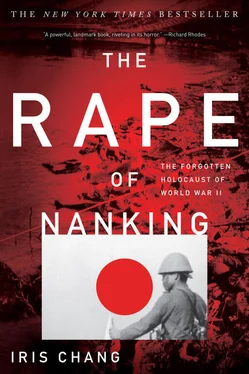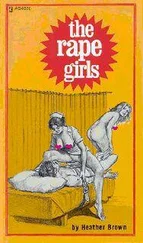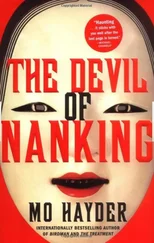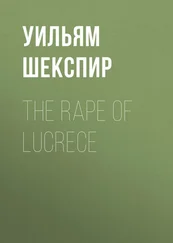After a while, the coolies had done their job of dragging corpses and the soldiers lined them up along the river. Rat-tat-tat machine-gun fire could be heard. The coolies fell backwards into the river and were swallowed by the raging currents. The pantomime was over.
A Japanese officer at the scene estimated that 20,000 persons had been executed.
From the Japanese military correspondent Omata Yukio, who saw Chinese prisoners brought to Hsiakwan and lined up along the river:
Those in the first row were beheaded, those in the second row were forced to dump the severed bodies into the river before they themselves were beheaded. The killing went on non-stop, from morning until night, but they were only able to kill 2,000 persons in this way. The next day, tired of killing in this fashion, they set up machine guns. Two of them raked a cross-fire at the lined-up prisoners. Rat-tat-tat-tat. Triggers were pulled. The prisoners fled into the water, but no one was able to make it to the other shore.
From the Japanese photojournalist Kawano Hiroki:
Before the “Ceremony of Entering the City,” I saw fifty to one hundred bodies drifting down the Yangtze River. Did they die in battle, or were they killed after being taken prisoner? Or were they slaughtered civilians?
I remember there was a pond just outside Nanking. It looked like a sea of blood—with splendid colors. If only I had color film… what a shocking shot that would have been!
Sasaki Motomasa, a Japanese military correspondent at Nanking, observed, “I’ve seen piled-up bodies in the Great Quake in Tokyo, but nothing can be compared to this.”
Next, the Japanese turned their attention to the women.
“Women suffered most,” Takokoro Kozo, a former soldier in the 114th Division of the Japanese army in Nanking, recalled. “No matter how young or old, they all could not escape the fate of being raped. We sent out coal trucks from Hsiakwan to the city streets and villages to seize a lot of women. And then each of them was allocated to 15 to 20 soldiers for sexual intercourse and abuse.”
Surviving Japanese veterans claim that the army had officially outlawed the rape of enemy women. But rape remained so deeply embedded in Japanese military culture and superstition that no one took the rule seriously. Many believed that raping virgins would make them more powerful in battle. Soldiers were even known to wear amulets made from the pubic hair of such victims, believing that they possessed magical powers against injury.
The military policy forbidding rape only encouraged soldiers to kill their victims afterwards. During an interview for the documentary In the Name of the Emperor , Azuma Shiro, a former Japanese soldier, spoke candidly about the process of rape and murder in Nanking:
At first we used some kinky words like Pikankan. Pi means “hip,” kankan means “look.” Pikankan means, “Let’s see a woman open up her legs.” Chinese women didn’t wear underpants. Instead, they wore trousers tied with a string. There was no belt. As we pulled the string, the buttocks were exposed. We “pikankan.” We looked. After a while we would say something like, “It’s my day to take a bath,” and we took turns raping them. It would be all right if we only raped them. I shouldn’t say all right. But we always stabbed and killed them. Because dead bodies don’t talk.
Takokoro Kozo shared Azuma’s bluntness in discussing the issue. “After raping, we would also kill them,” he recalled. “Those women would start to flee once we let them go. Then we would ‘bang!’ shoot them in the back to finish them up.” According to surviving veterans, many of the soldiers felt remarkably little guilt about this. “Perhaps when we were raping her, we looked at her as a woman,” Azuma wrote, “but when we killed her, we just thought of her as something like a pig.”
This behavior was not restricted to soldiers. Officers at all levels indulged in the orgy. (Even Tani Hisao, the senior general and commander of the Japanese 6th Division, was later found guilty of raping some twenty women in Nanking.) Some not only urged soldiers to commit gang rape in the city but warned them to dispose of the women afterwards to eliminate evidence of the crime. “Either pay them money or kill them in some out-of-the-way place after you have finished,” one officer told his underlings.
THE ARRIVAL OF MATSUI IWANE
The killing and raping subsided when Matsui Iwane, still weak from his illness, entered the city on the morning of December 17 for a ceremonial parade. After recovering from his bout of tuberculosis, he traveled upriver on a naval launch and rode by car to the triple archway of the Mountain Gate on the east side of Nanking. There he mounted a chestnut horse, wheeled it to face the direction of the imperial palace in Tokyo, and led a triple banzai for the emperor for Japan’s national radio broadcasting company: “Great Field Marshal on the Steps of Heaven—banzai—ten thousand years of life!” He rode down a boulevard that was carefully cleared of dead bodies and flanked by tens of thousands of cheering soldiers and arrived at the Metropolitan Hotel in the northern part of town, which held a banquet for Matsui that evening.
It was sometime during this banquet, the record suggests, that Matsui suspected that something had gone terribly amiss at Nanking. That evening he called a staff conference and ordered all unnecessary troops transferred out of the city. The next day the Western news media reported that the Japanese army was engaged in a giant conspiracy of silence against Matsui to prevent him from knowing the full truth of the Nanking atrocities.
When Matsui began to comprehend the full extent of the rape, murder, and looting in the city, he showed every sign of dismay. On December 18, 1937, he told one of his civilian aides: “I now realize that we have unknowingly wrought a most grievous effect on this city. When I think of the feelings and sentiments of many of my Chinese friends who have fled from Nanking and of the future of the two countries, I cannot but feel depressed. I am very lonely and can never get in a mood to rejoice about this victory.” He even let a tinge of regret flavor the statement he released to the press that morning: “I personally feel sorry for the tragedies to the people, but the Army must continue unless China repents. Now, in the winter, the season gives time to reflect. I offer my sympathy, with deep emotion, to a million innocent people.”
Later that day, when the Japanese command held a burial service for the Japanese soldiers who died during the invasion, Matsui rebuked the three hundred officers, regimental commanders, and others on the grounds for the orgy of violence in the city. “Never before,” Matsumoto, a Japanese correspondent wrote, “had a superior given his officers such a scathing reprimand. The military was incredulous at Matsui’s behavior because one of the officers present was a prince of Imperial descent.”
By Sunday, December 19, Matsui was moved to Asaka’s headquarters outside the city and put on a destroyer the following day to be sent back to Shanghai. But once there he made an even more shocking move, one perhaps driven by desperation: he confided his worries to the New York Times and even told an American foreign correspondent that “the Japanese army is probably the most undisciplined army in the world today.” That month he also sent a bold message to Prince Asaka’s chief of staff. “It is rumored that unlawful acts continue,” he wrote. “Especially because Prince Asaka is our commander, military discipline and morals must be that much more strictly maintained. Anyone who misconducts himself must be severely punished.”
Читать дальше











